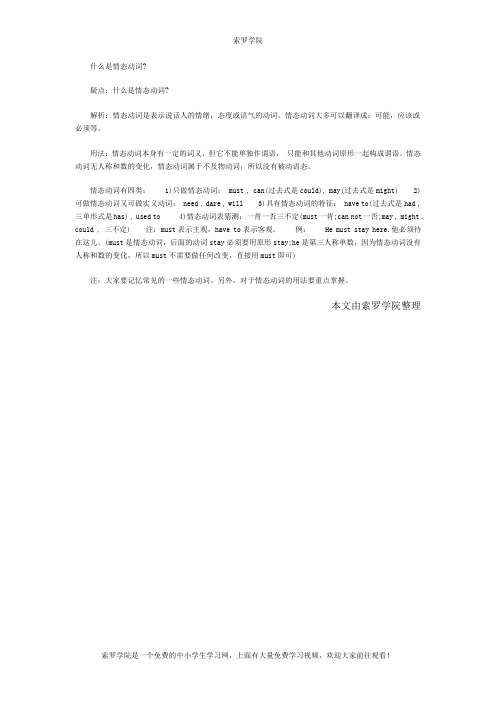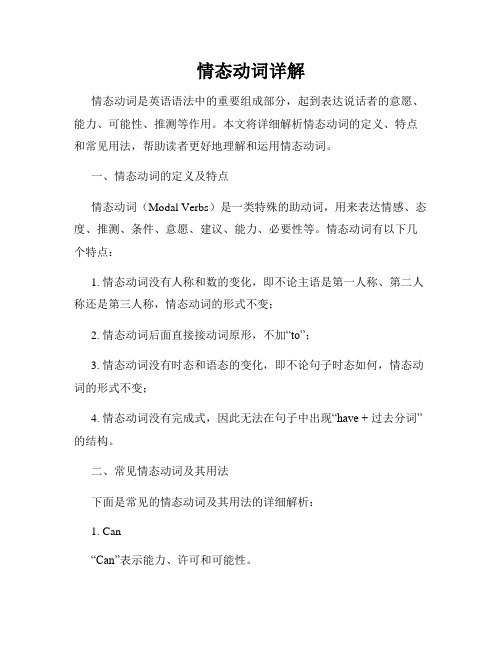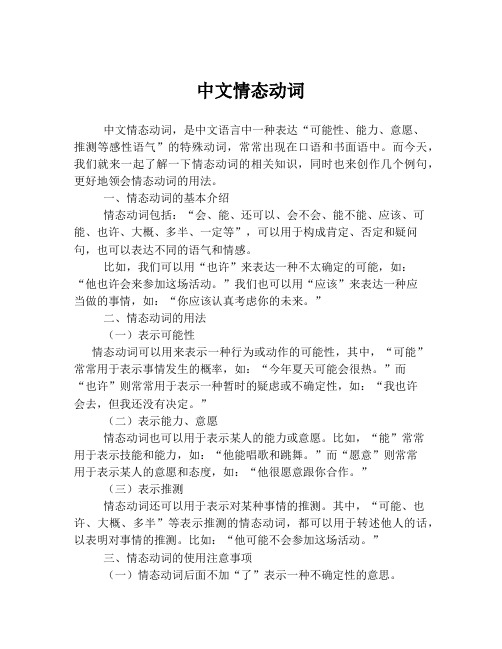情态动词
什么是情态动词

索罗学院
什么是情态动词?
疑点:什么是情态动词?
解析:情态动词是表示说话人的情绪,态度或语气的动词。
情态动词大多可以翻译成:可能,应该或
必须等。
用法:情态动词本身有一定的词义,但它不能单独作谓语,只能和其他动词原形一起构成谓语。
情态动词无人称和数的变化,情态动词属于不及物动词,所以没有被动语态。
情态动词有四类:1)只做情态动词: must , can(过去式是could), may(过去式是might) 2)可做情态动词又可做实义动词: need , dare , will 3)具有情态动词的特征: have to(过去式是had , 三单形式是has) , used to 4)情态动词表猜测:一肯一否三不定(must一肯;can not一否;may , might , could , 三不定) 注:must表示主观,have to表示客观。
例:He must stay here.他必须待在这儿。
(must是情态动词,后面的动词stay必须要用原形stay;he是第三人称单数,因为情态动词没有人称和数的变化,所以must不需要做任何改变,直接用must即可)
注:大家要记忆常见的一些情态动词。
另外,对于情态动词的用法要重点掌握。
本文由索罗学院整理索罗学院是一个免费的中小学生学习网,上面有大量免费学习视频,欢迎大家前往观看!。
常用的情态动词八个用法

常用的情态动词八个用法情态动词是英语中非常重要的一类动词,它们可以用来表达说话者的态度、意愿、推测、建议等。
在英语中,常用的情态动词有八个,分别是can、could、may、might、shall、should、will和would。
下面我们来看看这八个情态动词的用法。
1. Can和CouldCan和could都表示能力或可能性。
Can表示现在的能力或可能性,而could则表示过去的能力或可能性。
例如:- I can speak English.(我会说英语。
)- When I was young, I could run very fast.(我小时候跑得很快。
)2. May和MightMay和might都表示可能性,但may的可能性更大一些。
例如:- It may rain tomorrow.(明天可能会下雨。
)- He might be late.(他可能会迟到。
)3. Shall和ShouldShall和should都表示建议或义务。
Shall用于第一人称,should 用于第二人称和第三人称。
例如:- Shall we go to the cinema tonight?(今晚我们去看电影好吗?)- You should study harder.(你应该更加努力学习。
)4. Will和WouldWill和would都表示意愿或推测。
Will表示现在或将来的意愿或推测,而would则表示过去或虚拟的意愿或推测。
例如:- I will help you with your homework.(我会帮你做作业。
)- If I had more time, I would travel around the world.(如果我有更多时间,我会周游世界。
)情态动词在英语中是非常重要的一类动词,掌握它们的用法对于学好英语非常有帮助。
情态动词

2) 用来代替may, 谈现在的情况,口气比may更婉转些: A. 表示“可以”(用may时更多一些) Might (may) I have a little brandy? Might I use your phone? B.表示“可能”,“或许” He might tell his wife. She might not believe your story. 3)用于虚拟条件句: If I had known the film was about China, I might have gone to see it. 要是知道这影片是有关于中国的,我可能就去看了 If you invited him, he might come. 如果你邀请他,他可能会来 If you didn’t mind, we might go there. 如果你要晚到,你可以告诉我一声
情态动词
含义和特征
情态动词只有情态意义,即它表示的是说话人对 动作的观点,如需要、可能、意愿或怀疑等。情 态动词具有以下特征: 1)在形式上,情态动词没有实义动词的各种变化, 只有could、would、had to、was(were) to 、 might等几个过去式,其他的如 must、 ought to 等的过去式与现在式同形。 2) 在意义上,大多数情态动词有多个意义。如 can 可表示可能、能够、允许等,may可表示可 能、允许、目的、让步等。 3)在用法上,情态动词与助动词一样,后面须 接动词原形,构成谓语动词。
might的用法
might 主要由以下用法: 1) 用作may的过去式 A. 表示“可以” I asked if I might go home half an hour earlier today. 我问我是否可以提早半小时回家 He asked if he might use the phone. 他问是否可以用一下电话 B.表示“可能”(或许会) He said he might be late. I guessed he might come tomorrow. C. 用在某些状语从句: I did this so that I might have time to prepare my paper. 我这样做以便我有时间把稿子准备好 Try as she might, she could not persuade her friends to go. 不管她这样想办法,都不能说动她的朋友们去
情态动词归类大全

情态动词一:情态动词的用法:常用的情态动词有can,may,must,need,should, had better.1. can 的用法:①表示能力“能,会” eg: He can speak a little Japanese.他会说一点日语。
②表示请求或许可“可以” eg: Can I help you 要我帮忙吗③表示猜测“可能” eg: Where can she go now 她可能到哪里去了呢的用法:①表示请求或允许“可以”“准许” eg: May I go home,please请问我可以回家吗②表示可能性“可能”、也许” eg: I think it may rain this afternoon. 我想今天下午可能下雨。
注:might为may的过去式,但也可以代替may,语气较为婉转客气或更加不肯定。
eg: ① He might not come today.今天他也许不来了。
(语气不肯定)②You might also get a headache when you work too hard,当你工作太努力时,你也可能患头痛3. must的用法:①表示义务、必要或命令“必须、应该” eg: You must come early tomorrow.你明天得早来。
②表示推测时“肯定,一定” eg: They must be at light is on 他们肯定在家,灯亮着呢.③ must not 禁止,不许 eg: You must not tell lies. 你不许撒谎。
注意:①must开头的疑问句,其否定回答通常用 don't have to 或needn't 。
而不用mustn'teg: ---Must I finish my homework first 我必须先完成作业吗---No, you don't have to/ needn't. 不,你不必。
情态动词详解

情态动词详解情态动词是英语语法中的重要组成部分,起到表达说话者的意愿、能力、可能性、推测等作用。
本文将详细解析情态动词的定义、特点和常见用法,帮助读者更好地理解和运用情态动词。
一、情态动词的定义及特点情态动词(Modal Verbs)是一类特殊的助动词,用来表达情感、态度、推测、条件、意愿、建议、能力、必要性等。
情态动词有以下几个特点:1. 情态动词没有人称和数的变化,即不论主语是第一人称、第二人称还是第三人称,情态动词的形式不变;2. 情态动词后面直接接动词原形,不加“to”;3. 情态动词没有时态和语态的变化,即不论句子时态如何,情态动词的形式不变;4. 情态动词没有完成式,因此无法在句子中出现“have + 过去分词”的结构。
二、常见情态动词及其用法下面是常见的情态动词及其用法的详细解析:1. Can“Can”表示能力、许可和可能性。
能力:用于表达某人在某方面具有的能力或技能。
例句:He can speak three languages.许可:用于征求或给予许可。
例句:Can I borrow your pen, please?可能性:用于表达可能发生的情况。
例句:It can rain tomorrow.2. Could“Could”是Can的过去式,表示过去或虚拟条件下的能力、许可和可能性。
能力(过去):用于表达过去具备的能力或技能。
例句:When I was young, I could run very fast.许可(过去):用于过去征求或给予许可。
例句:Could I use your phone yesterday?可能性(虚拟条件):用于表示虚拟情况下的可能性。
例句:If I had enough money, I could travel around the world.3. May“May”表示允许、可能性、祝愿和推测。
允许:用于征求或给予许可。
例句:May I come in?可能性:用于表达主观推测的可能性。
什么叫情态动词

什么叫情态动词
情态动词是一种本身有一定的词义,表示说话人的情绪,态度或语气的动词,但不能单独作谓语,只能和其他动词原形构成谓语.
We can be there on time tomorrow.
我们明天能按时去那儿.
May I have your name?
我能知道你的名字吗?
Shall we begin now?
我们现在就开始吗?
You must obey the school rules.
你必须遵守校规.
情态动词数量不多,但用途广泛,主要有下列:
can (could),may (might),must,need,ought to,dare (dared),shall (should),will (would) .
情态动词的位置:
情态动词在句中放在谓语动词之前,谓语动词前若有助动词,则在助动词之前,疑问句中,情态动词则在主语之前.
情态动词无人称和数的变化,情态动词后面跟的动词需用原形,否定式构成是在情态动词后面加 "not".个别情态动词有现在式和过去式两种形式,过去式用来表达更加客气,委婉的语气,时态性不强,可用于过去,现在或将来.。
中文情态动词

中文情态动词中文情态动词,是中文语言中一种表达“可能性、能力、意愿、推测等感性语气”的特殊动词,常常出现在口语和书面语中。
而今天,我们就来一起了解一下情态动词的相关知识,同时也来创作几个例句,更好地领会情态动词的用法。
一、情态动词的基本介绍情态动词包括:“会、能、还可以、会不会、能不能、应该、可能、也许、大概、多半、一定等”,可以用于构成肯定、否定和疑问句,也可以表达不同的语气和情感。
比如,我们可以用“也许”来表达一种不太确定的可能,如:“他也许会来参加这场活动。
”我们也可以用“应该”来表达一种应当做的事情,如:“你应该认真考虑你的未来。
”二、情态动词的用法(一)表示可能性情态动词可以用来表示一种行为或动作的可能性,其中,“可能”常常用于表示事情发生的概率,如:“今年夏天可能会很热。
”而“也许”则常常用于表示一种暂时的疑虑或不确定性,如:“我也许会去,但我还没有决定。
”(二)表示能力、意愿情态动词也可以用于表示某人的能力或意愿。
比如,“能”常常用于表示技能和能力,如:“他能唱歌和跳舞。
”而“愿意”则常常用于表示某人的意愿和态度,如:“他很愿意跟你合作。
”(三)表示推测情态动词还可以用于表示对某种事情的推测。
其中,“可能、也许、大概、多半”等表示推测的情态动词,都可以用于转述他人的话,以表明对事情的推测。
比如:“他可能不会参加这场活动。
”三、情态动词的使用注意事项(一)情态动词后面不加“了”表示一种不确定性的意思。
(二)情态动词表示的是一种语气或态度,因此语境和语气的不同会导致情态动词的意义产生变化。
(三)情态动词不能单独使用,需要和实义动词结合使用。
举个例子,“我能打篮球。
”中的“能”表示能力,可是这个句子如果单独使用,则就成为一个空洞的句子,没有完整的语义。
四、情态动词的例句1、他会唱歌,跳舞和演讲,是一个全才。
(表达技能和能力)2、我应该已经赶上去了。
(表达可能性)3、我也许会去,但我不能确定。
情态动词

Must I do it at once? Yes, you must. / No, you needn’t.或No, you don’t have to. 或 We must obey all the rules. You must not smoke here. ② must还可表示必然结果 还可表示必然结果 All men must die. 人固有一死。 人固有一死。 If you don’t hurry, you must miss the train. 如果不快点,你必然要误车。 如果不快点,你必然要误车。 2. Have to 着重客观需要,能用于更多事态(过去,将来) 着重客观需要,能用于更多事态(过去,将来) He will have to be there before ten. 10点以前他得到那里。 点以前他得到那里。 点以前他得到那里 As he had broken his leg, he had to lie in bed. 因为断了腿,他不得不躺在床上。 因为断了腿,他不得不躺在床上。 3. Ought to表示义务和责任,“应该”,比should 语气强。 表示义务和责任, 应该” 语气强。 表示义务和责任
- 1、下载文档前请自行甄别文档内容的完整性,平台不提供额外的编辑、内容补充、找答案等附加服务。
- 2、"仅部分预览"的文档,不可在线预览部分如存在完整性等问题,可反馈申请退款(可完整预览的文档不适用该条件!)。
- 3、如文档侵犯您的权益,请联系客服反馈,我们会尽快为您处理(人工客服工作时间:9:00-18:30)。
情态动词情态动词表示说话人对某一动作或状态的态度,可以表示“可能”、“可以”、“需要”、“必须”或“应当”等之意。
情态动词没有人称和数的变化。
但不能单独作谓语动词用,必须和不带to的不定式连用构成谓语动词。
只有情态动词ought要和带to的动词不定式连用,在句中作谓语用。
一.can/ be able tocan 表客观的能力,be able to表通过主观的努力,能够……eg. He is a native speaker of English, so he can speak English well.The fire was big, but he was able to escape.二.shall 用于二、三人称表命令,警告,威胁。
宣布法律,法规时用shall.eg. The judge declared that all the money shall belong to the wife.三.1. should 表推测时指确定或期望,即合乎理想的情况或结果。
It’s nearly seven o’clock. Jack should be here at any moment.2. should 表“竟然”How should he do like this?四.情态动词表推测的三种时态。
1.对将来情况的推测,用“情态动词+ 动词原形”。
eg. She must / may / might / could arrive before 5. 5:00前她一定/可能/也许到。
2.对现在或一般情况的推测,用“情态动词+ be”,“情态动词+be doing”或“情态动词+ 动词原形”。
(1)He must / may / might / could be listening to the radio now.他一定/可能/也许正在听收音机。
(2)He can’t ( couldn’t ) / may ( might ) not be at home at this time.这个时候他不可能/可能不在家。
(3)Mr. Bush is on time for everything .How can ( could ) he be late for the opening ceremony ? 布什先生一向准时,这次开幕式他怎么可能迟到呢?3.对过去情况的推测,用“情态动词+ have +过去分词”。
(1)It must / may / might / could have rained last night .The ground is wet.地湿了,昨晚肯定/可能/也许下雨了。
(2)The door was locked. He can ( could ) not / may ( might ) not have been at home .门锁着,他不可能/可能不在家。
(3)Can / Could he have gotten the book?难道他找到书了吗?五.1. may 表征求对方意见。
May I have a look at it ?2.表推测时may 表不确定。
eg. The train might leave at six, but I’m not sure.3. may /might as well 不妨……,不如……eg. It is dark and you may as well stay here .Since the flight was cancelled,you might as well go by train.六.情态动词+ have done1. should (not) have doneought (not) to have done 本应该做某事。
eg. You should have come here earlier.You oughtn’t to have eaten too much.2. must have done 表示对过去已经发生的行为进行推测,意为“一定做了某事”eg. It must have rained last night, for the road was quite muddy.may / might have +过去分词,表示对已发生的事情做不肯定、可能性很小的推测,或事实上根本没发生,译为“也许……”。
如:3. couldn’t have done / can’t have done表示对已发生情况的否定推测,“不可能做了某事”eg.Time was limited, so he could n’t have finished the task.4. needn’t have done “本没有必要做了某事”eg. You needn’t have taken a taxi here, for it was near to your house.needn’t do “没必要去做某事”You needn’t go now.七、It couldn’t be better. / It couln’t be worse. (交际用语)那再好不过了。
/那再糟糕不过了。
八、must 表达“情感、态度、语气”主要有以下用法:(1) 表示主观的义务和必要,主要用于肯定句和疑问句,意思为“必须……,得……,要……”;由must引起的疑问句,肯定回答要用must或have to,否定回答要用needn’t或don’t have to,意思是“不必”。
另外,must与have to都可以表示“必须”这一含义。
must表示一种主观的需要,而have to表示一种客观的需要,意思是“不得不”,其否定形式是don’have to。
eg.What sort of house do you want to have? Something big?--Well, it ______ be big--that's not important.A. mustn'tB. needn'tC. can'tD. won't(2) must的否定形式mustn’t表示禁止,意思是“不能,不许”。
例如:eg. When I was young, I was told that I ______ play with matchesA. wouldn'tB. needn'tC. mustn'tD. daren't(3) must用于条件句或疑问句中,可以用来表示责备、抱怨的感情色彩,意思为“偏要,硬要、干嘛”。
eg. John, look at the time. ___________ you play the piano at such a late hour?A.Must B.Can C.May D.Need选择题1. —When can I come to pick up my computer? I need it next Monday.—They ________ be repaired by this Sunday.A. canB. shouldC. mightD. need2. How ______ they expect to learn anything when they spend all their spare time watching TV?A. canB. shouldC. mightD. could3. Had I studied harder in senior school, I ________ a university now.A. amB. will beC. would beD. must be4. Can you believe that he _________ marry his young daughter to such an old man onlybecause he is rich.A. wouldB. shouldC. mustD. can5. —May I use your car, Mom?—Well…, if you __________.A. canB. mustC. needD. should6. Seriously hurt as he was, he _________ tell the police what had happened.A. couldB. mightC. was able toD. couldn’t7. —A bike for me ? Father ________ have chosen a better gift for my birthday.—He _______ be very happy to know it.A. should; mustB. might; wouldn’tC. couldn’t; mustD. mustn’t; can’t8. _________ it rain tomorrow, the sports meet would be put off until next week.A. ShouldB. HadC. IfD. Suppose9.—Mary looks very upset. She ______ failed to pass the exam.—I guess so. It’s very difficult after all.A. should haveB. could haveC. must haveD. might have10. When we worked in the same office, we _______ often have coffee together.A. mightB. shouldC. couldD. would11. It’s so late. Where __________ she have gone?A. canB. mustC. shouldD. would12. The murder _________ caused due to his affairs and the police are still looking into it for further information. .A. could beB. must have beenC. might have beenD. should have been13.—No wonder you are so sleepy. You ________video games for so long.—I regret having done it now.A. shouldn’t have playedB. mustn’t have playedC. couldn’t have playedD. might not have played14. Generally, Tom is a good boy, but he ______be very annoying.A. shouldB. mustC. willD. can15. Since you have made such good preparations, there ________ be any problem about passing the coming exam.A. mustn’tB. shan’tC. shouldn’tD. needn’t16. She _______ you more help, even though she was very busy.A. might have offeredB. might offerC. may have offeredD. may offer17. John _______ pay a visit to me this afternoon, so I don’t want to go out in case he comes.A. canB. mustC. mayD. will18. Mike, you _______ leave all your toys in a mass on the floor like this.A. wouldn’tB. mustn’tC. needn’tD. may not19. I believe Shackleton __________ this unexpected end to his expedition, but he did not waste time on regrets.A. must have mournedB. must mournC. can have mournedD. could mourn20. I often see lights in that empty house. Do you think I ______report it to the police?A. shouldB. mayC. willD. can答案:1-5 BACBB 6-10 CCACD 11-15 ACADC16-20 ACBAA1. I didn’t see her in the meeting room this morning. She _____ at the meeting.A. mustn’t have spokenB. shouldn’t have spokenC. needn’t have spokenD. couldn’t have spoken2. One ought _____ for what one hasn’t done.A. not to be punishedB. to not be punishedC. to not punishedD. not be punished3. If you really want yourself to be in good health, you must ___ always ___ so much.A. not; be smokingB. not; have smokedC. not; to smokeD. be not; smoking4. With so much work on hand, you _____ to see the game last night.A. mustn’t goB. shouldn’t goC. couldn’t have goneD. shouldn’t have gone5. Most of the students felt rather disappointed at the English party. They say that it ______ better organized.A. had beenB. had to beC. must have beenD. could have been答案: DAADD。
